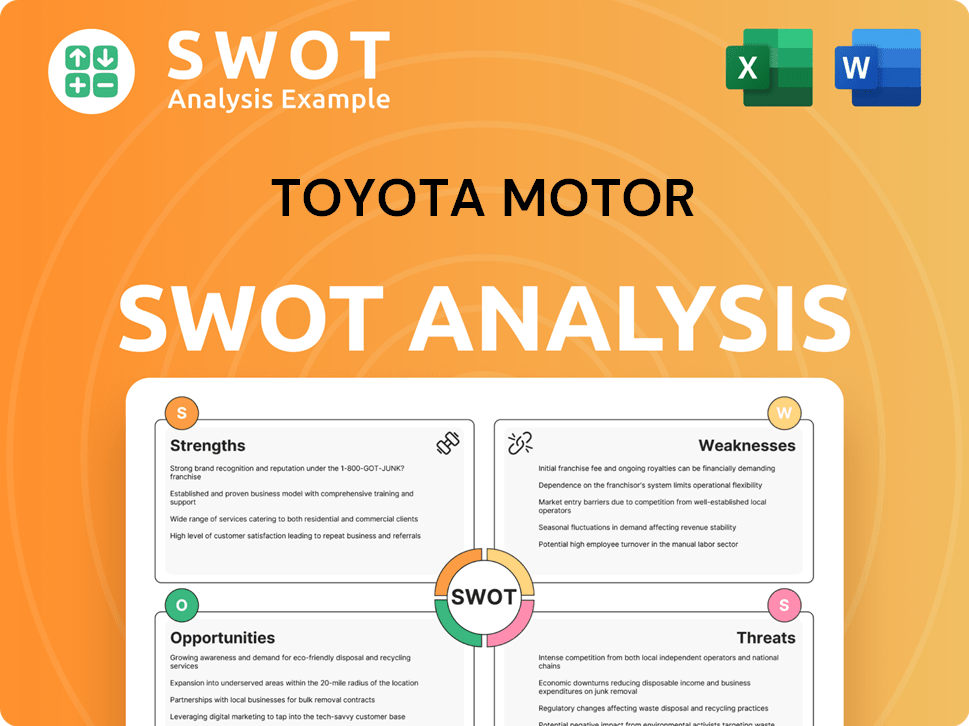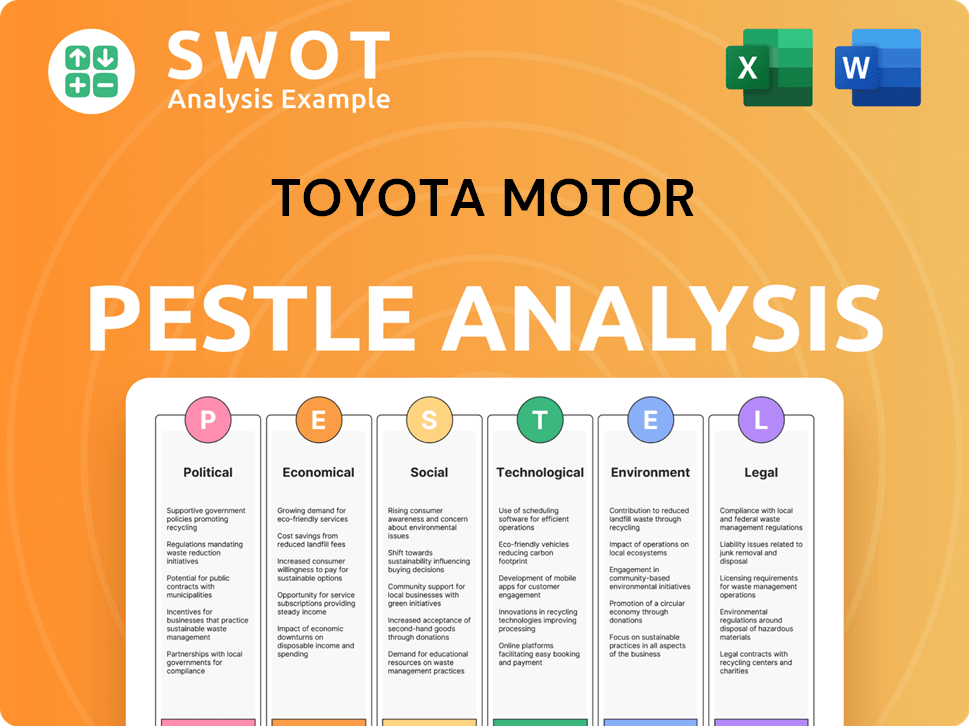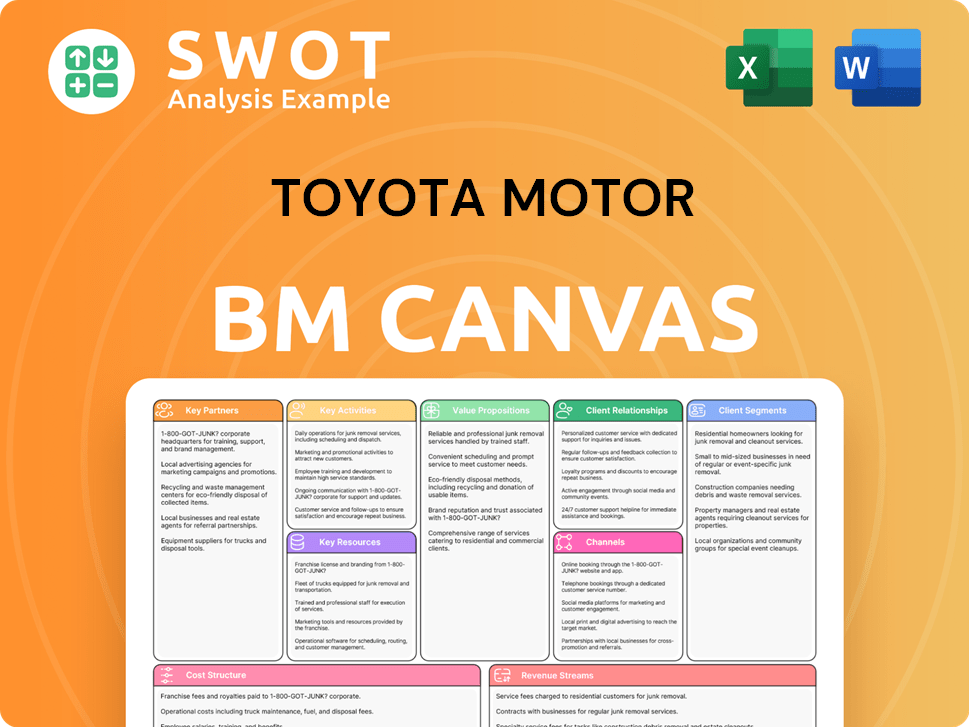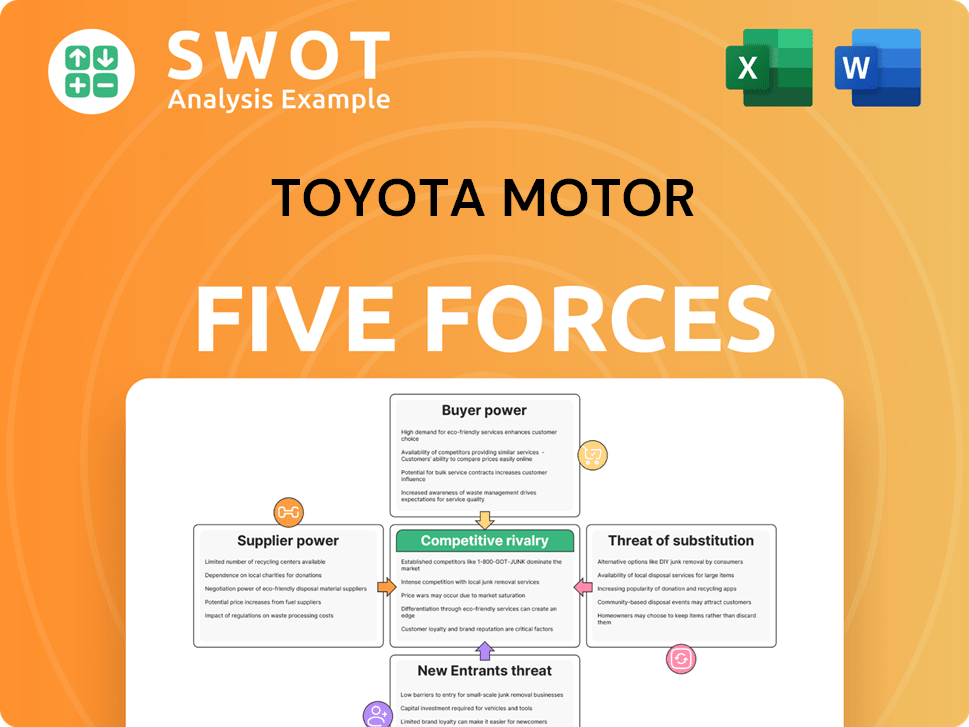Toyota Motor Bundle
How Does Toyota Motor Company Thrive in the Global Market?
Toyota Motor Company, a global automotive powerhouse, consistently dominates the industry, recently achieving record-breaking revenue in fiscal year 2024, fueled by strong sales of its hybrid and electric vehicles. Its brand value soared to an impressive $64.7 billion in 2025, solidifying its position as a market leader. This success stems from its diverse operations, including passenger cars, financial services, and more, making it a compelling subject for analysis.

This deep dive into Toyota's operations, from Toyota Motor SWOT Analysis to its global market strategy, reveals the intricate mechanisms behind its sustained success. We'll explore Toyota's business model, examining its manufacturing, production, and supply chain, alongside its financial performance analysis and electric vehicle strategy. Understanding how Toyota designs its cars and manages its suppliers provides crucial insights for investors and industry observers alike, offering a comprehensive view of this automotive giant.
What Are the Key Operations Driving Toyota Motor’s Success?
Toyota Motor Company creates and delivers value through its extensive range of automotive products and services. Its core offerings include passenger cars, minivans, commercial vehicles, and related parts and accessories. The company's operations are underpinned by the Toyota Production System (TPS), a manufacturing philosophy focused on eliminating waste and maximizing efficiency.
The Toyota business model relies heavily on the Toyota Production System (TPS), often referred to as 'lean' or 'Just-In-Time' (JIT) manufacturing. This system minimizes inventory by producing only what is needed, when it is needed, and in the exact quantity required. This approach significantly reduces waste and improves overall efficiency. Furthermore, 'Jidoka' is integrated, which combines automation with human oversight to immediately identify and address defects.
Toyota's commitment to customer satisfaction is evident in its consistently high rankings in customer satisfaction surveys. Brand loyalty rates were around 60% as of 2024, indicating a significant proportion of customers choose to repurchase Toyota vehicles. This dedication to quality, durability, and innovation translates into customer benefits and market differentiation, reinforcing Toyota's competitive edge.
Toyota's core products include a diverse range of vehicles. These include passenger cars, minivans, and commercial vehicles. The company also provides related parts and accessories to support its vehicles.
Toyota has a significant global footprint. It operates manufacturing facilities in numerous countries. This global presence allows the company to respond to regional demands and preferences effectively.
The Toyota Production System (TPS) is central to Toyota's manufacturing. It emphasizes waste reduction and efficiency. The system incorporates Just-In-Time (JIT) inventory management and 'Jidoka' for quality control.
Toyota's supply chain is a benchmark for excellence. The company builds long-term partnerships with suppliers. This approach ensures high quality and timely delivery of components, supporting the overall production process.
Toyota's success is built on several key operational strengths. These include its efficient manufacturing processes, robust supply chain, and focus on customer satisfaction. These elements work together to create a strong and competitive business.
- Lean Manufacturing: Toyota's lean manufacturing process explained minimizes waste and maximizes efficiency.
- Supply Chain Resilience: The supply chain is designed for adaptability and long-term partnerships.
- Customer Focus: High customer satisfaction and brand loyalty drive repeat business.
- Global Strategy: Toyota's global market strategy includes manufacturing close to key markets.
Toyota Motor SWOT Analysis
- Complete SWOT Breakdown
- Fully Customizable
- Editable in Excel & Word
- Professional Formatting
- Investor-Ready Format

How Does Toyota Motor Make Money?
The Owners & Shareholders of Toyota Motor generate revenue through a diverse set of operations. The company primarily relies on automotive sales, financial services, and other business ventures to generate income. This multi-faceted approach allows the company to cater to a wide range of customer needs and market conditions.
The automotive segment is the primary revenue driver, encompassing the design, manufacturing, and distribution of vehicles and related parts. Financial services, including loans and leasing, provide another substantial source of income. Additionally, the 'All other' segment, which includes ventures like prefabricated housing, contributes to overall revenue.
These revenue streams are supported by strategic monetization strategies. These include a diverse product portfolio, strategic pricing, and continuous innovation, particularly in eco-friendly vehicles. This approach helps the company maintain its competitive edge and meet evolving consumer demands.
The automotive segment is the largest revenue contributor for the company. This segment includes the design, manufacturing, assembly, and distribution of passenger cars, minivans, and commercial vehicles. It also includes the sale of related parts and accessories.
Financial services represent a significant revenue stream. This segment offers retail auto loans and leasing, credit cards, and home loans. These services expand the company's financial connections with customers.
The 'All other' segment includes various businesses, such as the design and manufacturing of prefabricated housing. This segment contributes to the company's diversified revenue streams.
The company employs various strategies to monetize its operations. These include leveraging a diverse product portfolio, strategic pricing, and continuous product development. A key focus is on eco-friendly vehicles.
Sales revenues in the automotive segment increased by 4.7% to 43,199.8 billion yen in FY2025 compared to FY2024. This growth reflects the strong demand for the company's vehicles and effective sales strategies.
Sales revenues for financial services increased by 28.6% to 4,481.1 billion yen in FY2025 compared to FY2024. Operating income from financial services increased by 19.9% to 683.5 billion yen in FY2025.
The company's revenue streams are diversified across automotive, financial services, and other businesses. The automotive segment remains the largest contributor, with significant growth in FY2025. Financial services also showed substantial growth, increasing both sales revenues and operating income. The 'All other' segment contributed to the overall revenue with a modest increase.
- Automotive Operations: Design, manufacture, and distribution of vehicles and related parts.
- Financial Services: Retail auto loans and leasing, credit cards, and home loans.
- Other Businesses: Activities like designing and manufacturing prefabricated housing.
- FY2025 Automotive Sales: Increased by 4.7% to 43,199.8 billion yen.
- FY2025 Financial Services Sales: Increased by 28.6% to 4,481.1 billion yen.
- FY2025 Financial Services Operating Income: Increased by 19.9% to 683.5 billion yen.
Toyota Motor PESTLE Analysis
- Covers All 6 PESTLE Categories
- No Research Needed – Save Hours of Work
- Built by Experts, Trusted by Consultants
- Instant Download, Ready to Use
- 100% Editable, Fully Customizable

Which Strategic Decisions Have Shaped Toyota Motor’s Business Model?
Toyota Motor Company's journey is marked by significant milestones and strategic moves that have solidified its position as a global leader in the automotive industry. The company's commitment to innovation, particularly in hybrid technology with the Prius, has been a cornerstone of its success. Toyota's strategic focus on sustainable mobility has not only resonated with consumers but has also significantly boosted its brand value.
Toyota's adaptability is evident in its response to operational challenges, such as supply chain disruptions, and its proactive investments in new growth areas. The company continues to invest in research and development, particularly in environmentally friendly vehicle technologies, vehicle safety, and information technology. This ongoing commitment ensures Toyota remains competitive in a rapidly evolving market.
The company's competitive advantages are multifaceted, including a strong brand reputation, the efficient Toyota Production System (TPS), and a vast global presence. Toyota continues to adapt to changing consumer preferences and technological shifts, further demonstrating its adaptability to new trends and technological shifts. For a deeper look into the company's approach, consider exploring the Marketing Strategy of Toyota Motor.
Toyota's pioneering work in hybrid technology, exemplified by the Prius, has been a major milestone. The company is expanding its eco-friendly vehicle portfolio by introducing fully electric models. Toyota's commitment to sustainable mobility has been a key driver of its success and brand value.
Toyota has strengthened its supply chain resilience and flexibility to navigate operational challenges. The company's response involves balancing Just-in-Time practices with strategic safety stock for critical components. Investments in new growth areas, R&D, and labor costs demonstrate a commitment to future growth.
Toyota's strong brand reputation, built on reliability and durability, fosters high customer loyalty. The Toyota Production System (TPS) provides an efficient production process. The company's extensive global presence allows it to tap into diverse markets and adapt to changing consumer preferences.
Toyota's brand value surged to $64.7 billion as of February 2025. Despite facing a challenging market, investments in new growth areas and R&D contributed to a decrease in operating income in Q3 FY2025. The company's financial strategy focuses on long-term sustainability and innovation.
Toyota's core strengths include its commitment to quality, continuous improvement, and customer satisfaction. The company emphasizes a multi-pathway approach to carbon neutrality, offering a choice of sustainable solutions. These values guide Toyota's operations and its impact on the automotive industry.
- Strong Brand Reputation: Built on reliability and durability.
- Efficient Production: The Toyota Production System (TPS) enables efficient manufacturing.
- Global Presence: Operations in over 170 countries.
- Innovation: Continuous investment in R&D, especially in green technologies.
Toyota Motor Business Model Canvas
- Complete 9-Block Business Model Canvas
- Effortlessly Communicate Your Business Strategy
- Investor-Ready BMC Format
- 100% Editable and Customizable
- Clear and Structured Layout

How Is Toyota Motor Positioning Itself for Continued Success?
Toyota Motor Company maintains a robust position in the global automotive market, consistently ranking among the top automakers. In January 2025, it secured a 26.2% share of the new car market in South Africa, up from 25.8% in January 2024. The company's brand value reached $64.7 billion in 2025, making it the world's most valuable automotive brand.
However, Toyota's operations face several risks, including intense competition and the ongoing shift towards electric vehicles. Supply chain disruptions and international market volatility also present challenges. Despite these risks, Toyota continues to invest in innovation and sustainability to secure its future.
Toyota's global market strategy has solidified its position as a leading automaker. In 2024, Toyota maintained a 38.5% market share in Thailand. The company's strong brand loyalty, with approximately 60% of customers repurchasing vehicles, also contributes to its market dominance.
Toyota's business model faces risks from competitors like Volkswagen and Tesla, as well as regulatory changes. The automotive industry's shift to electric vehicles and supply chain disruptions pose additional challenges. Competitors Landscape of Toyota Motor highlights the competitive environment.
Toyota's electric vehicle strategy involves a multi-pathway approach to carbon neutrality, including hybrids and BEVs. The company plans to launch six new Toyota BEVs in Europe by 2026 and three new Lexus BEVs in 2025. Toyota's focus is on innovation, sustainability, and customer-centric solutions.
The company is expanding its electric vehicle offerings and strengthening its supply chain. Leadership emphasizes continued investment in innovation and customer satisfaction to drive long-term growth. Toyota's environmental sustainability initiatives are also key to its future.
Toyota's operations are focused on adapting to changing market conditions. Key initiatives include expanding its electric vehicle lineup and optimizing the supply chain through technology. These efforts are aimed at ensuring Toyota's continued success in the automotive industry.
- Focus on a multi-pathway approach to carbon neutrality.
- Expansion of electric vehicle offerings, including BEVs and fuel cell vehicles.
- Strengthening supply chain resilience through technology and strategic partnerships.
- Continued investment in innovation, sustainability, and customer-centric solutions.
Toyota Motor Porter's Five Forces Analysis
- Covers All 5 Competitive Forces in Detail
- Structured for Consultants, Students, and Founders
- 100% Editable in Microsoft Word & Excel
- Instant Digital Download – Use Immediately
- Compatible with Mac & PC – Fully Unlocked

Related Blogs
- What are Mission Vision & Core Values of Toyota Motor Company?
- What is Competitive Landscape of Toyota Motor Company?
- What is Growth Strategy and Future Prospects of Toyota Motor Company?
- What is Sales and Marketing Strategy of Toyota Motor Company?
- What is Brief History of Toyota Motor Company?
- Who Owns Toyota Motor Company?
- What is Customer Demographics and Target Market of Toyota Motor Company?
Disclaimer
All information, articles, and product details provided on this website are for general informational and educational purposes only. We do not claim any ownership over, nor do we intend to infringe upon, any trademarks, copyrights, logos, brand names, or other intellectual property mentioned or depicted on this site. Such intellectual property remains the property of its respective owners, and any references here are made solely for identification or informational purposes, without implying any affiliation, endorsement, or partnership.
We make no representations or warranties, express or implied, regarding the accuracy, completeness, or suitability of any content or products presented. Nothing on this website should be construed as legal, tax, investment, financial, medical, or other professional advice. In addition, no part of this site—including articles or product references—constitutes a solicitation, recommendation, endorsement, advertisement, or offer to buy or sell any securities, franchises, or other financial instruments, particularly in jurisdictions where such activity would be unlawful.
All content is of a general nature and may not address the specific circumstances of any individual or entity. It is not a substitute for professional advice or services. Any actions you take based on the information provided here are strictly at your own risk. You accept full responsibility for any decisions or outcomes arising from your use of this website and agree to release us from any liability in connection with your use of, or reliance upon, the content or products found herein.